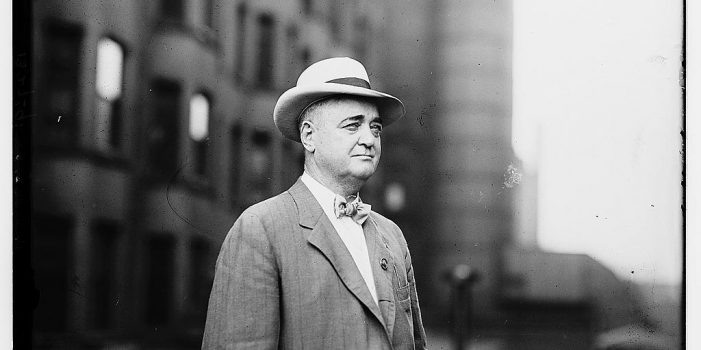There were few men in the West who could whip Earp in a rough-and tumble fight 30 years ago, and I suspect that he could give a tough youngster a hard tussle right now, even if he is 61 years of age.
In all probability had Morris been known as a peaceable citizen, he would have had his money returned when he asked for it, as Wyatt never cared much for money; but being known as a man with a reputation as a gunfighter, his only chance to get his money back lay in his ability to “do” Earp, and that was a job he did not care to tackle.
I have known Wyatt Earp since early in the ’70s, and have seen him tried out under circumstances that made the test of manhood supreme. He landed in Wichita, Kansas, in 1872, being then about 26 years old, and weighing in the neighborhood of 160 pounds, all of it muscle. He stood 6 feet in height, with light blue eyes, and a complexion bordering on the blonde. He was born at Monmouth, Illinois, of a clean strain of American breeding, and served in an Iowa regiment the last three years of the Civil War, although he was only a boy at the time. He always arrayed himself on the side of law and order, and on a great many occasions, at the risk of his life, rendered valuable service in upholding the majesty of the law in those communities in which he lived. In the spring of 1876 he was appointed Assistant City Marshal of Dodge City, Kansas, which was then the largest shipping point in the North for the immense herds of Texas cattle that were annually driven from Texas to the northern markets. Wyatt’s reputation for courage and coolness was well known to many of the citizens of Dodge City—in fact it was his reputation that secured for him the appointment of Assistant City Marshal.
He was not very long on the force before one of the alderman of the city, presuming somewhat on the authority his position gave him over a police officer, ordered Wyatt one night to perform some official act that did not look exactly right to him, and Wyatt refused point blank to obey the order. The alderman, regarded as something of a scrapper himself, walked up to Wyatt and attempted to tear his official shield from his vest front where it was pinned. When that alderman woke up he was a greatly changed man. Wyatt knocked him down as soon as he laid his hands on him, and then reached down and picked him up with one hand and slammed a few hooks and upper-cuts into his face, dragged his limp form over to the city calaboose, and chucked it in one of the cells, just the same as he would any other disturber of the peace. The alderman’s friends tried to get him out on bail during the night, but Wyatt gave it out that it was the calaboose for the alderman until the police court opened up for business at nine o’clock the following morning, and it was. Wyatt was never bothered any more while he lived in Dodge City by aldermen.” – William Barclay “Bat” Masterson, in “My Friend Wyatt Earp”











Is the picture Earp or Masterson?
Masterson.